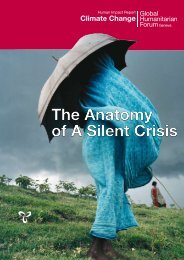Poverty Reduction Strategy Paper - UNDP Barbados and the OECS ...
Poverty Reduction Strategy Paper - UNDP Barbados and the OECS ...
Poverty Reduction Strategy Paper - UNDP Barbados and the OECS ...
You also want an ePaper? Increase the reach of your titles
YUMPU automatically turns print PDFs into web optimized ePapers that Google loves.
In recognition of <strong>the</strong> fact that economic prosperity does not necessarily bring an<br />
improvement in welfare, <strong>the</strong> government has indicated that direct state intervention<br />
would be needed to facilitate <strong>the</strong> objectives of <strong>the</strong> National <strong>Poverty</strong> <strong>Reduction</strong> <strong>Strategy</strong> in<br />
<strong>the</strong> medium to long term. In line with its overarching development objective, as<br />
articulated in <strong>the</strong> MTESP 2002 – 2004, <strong>the</strong> Government will vigorously implement <strong>the</strong><br />
necessary economic <strong>and</strong> social measures to ‘attain high levels of sustainable growth <strong>and</strong><br />
development, while reducing <strong>the</strong> levels of poverty.’ 24 As a means of informing <strong>and</strong><br />
streng<strong>the</strong>ning this process, it is proposed that a pro-poor budgetary analysis be conducted<br />
in order to evaluate <strong>the</strong> collective outcome of government’s expenditure, <strong>and</strong> thus to<br />
improve <strong>the</strong> government’s targeting of <strong>the</strong> poor.<br />
The main emphasis would be to implement a more focused diversification programme<br />
while putting <strong>the</strong> necessary measures in place towards attaining a more viable export<br />
sector <strong>and</strong> ensuring that <strong>the</strong> populace would be able to make use of <strong>the</strong> opportunities<br />
afforded <strong>the</strong>m to improve education <strong>and</strong> health.<br />
These objectives must take into account Government’s well-laid plans of maintaining<br />
fiscal integrity <strong>and</strong> good governance. In addition, <strong>the</strong> attainment of <strong>the</strong> development<br />
objectives must be predicated on <strong>the</strong> following, which are by no means exhaustive:<br />
?? Mobilising domestic resources for development.<br />
?? Improved <strong>and</strong> focused legal <strong>and</strong> regulatory framework to facilitate investment.<br />
?? Continued focus on pro-poor policies, particularly equity in access to <strong>the</strong> factors<br />
of production-l<strong>and</strong>, labour, knowledge <strong>and</strong> capital.<br />
?? More focused <strong>and</strong> deliberate policy for an improved implementation of<br />
programmes supporting economic growth <strong>and</strong> development.<br />
?? Implement <strong>the</strong> recommendations of <strong>the</strong> poverty reduction strategy 25 .<br />
In relation to <strong>the</strong> developmental goals for St. Vincent <strong>and</strong> <strong>the</strong> Grenadines, <strong>the</strong> Public<br />
Sector Investment Programme (PSIP) has been restructured to reflect <strong>the</strong> policies<br />
enunciated in <strong>the</strong> Medium Term Economic <strong>Strategy</strong> <strong>Paper</strong> 2002-2004 <strong>and</strong> recent Budget<br />
Addresses. Greater emphasis will be placed on achieving higher rates of implementation<br />
of <strong>the</strong> PSIP in order to build <strong>the</strong> necessary platform to facilitate private sector-led growth,<br />
while reducing <strong>the</strong> levels of poverty <strong>and</strong> improving <strong>the</strong> social infrastructure. In this<br />
regard proposed investment in <strong>the</strong> education <strong>and</strong> social sectors over <strong>the</strong> medium is<br />
expected to be 28.2 percent up from <strong>the</strong> 26.4 percent in <strong>the</strong> previous planning periods<br />
with <strong>the</strong> economic <strong>and</strong> o<strong>the</strong>r sectors accounting for <strong>the</strong> balance.<br />
Whilst Chapter five (5) provides a detailed analysis of <strong>the</strong> components of <strong>the</strong> <strong>Poverty</strong><br />
<strong>Reduction</strong> <strong>Strategy</strong>, it is clear that <strong>the</strong> effectiveness of <strong>the</strong> strategy is dependent on <strong>the</strong><br />
sequencing <strong>and</strong> prioritization of poverty reducing programmes. More importantly, it is<br />
imperative that priorities must be established given <strong>the</strong> limited resources available. The<br />
National Consensus on <strong>the</strong> goals <strong>and</strong> priorities of <strong>the</strong> National <strong>Poverty</strong> <strong>Reduction</strong><br />
24 Medium Term Economic <strong>Strategy</strong> <strong>Paper</strong> 2002-2004<br />
25 MTESP, Ibid, p 3-4<br />
Final SVG I-PRSP Revision June 2003<br />
27







